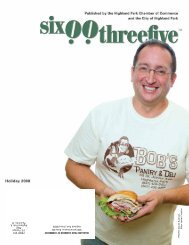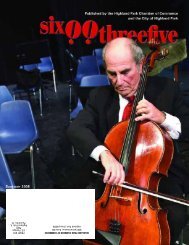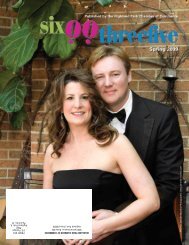PHOTOS: Matt Boltz, Engineer, Chicago Cubs Radio - Wordspecs
PHOTOS: Matt Boltz, Engineer, Chicago Cubs Radio - Wordspecs
PHOTOS: Matt Boltz, Engineer, Chicago Cubs Radio - Wordspecs
Create successful ePaper yourself
Turn your PDF publications into a flip-book with our unique Google optimized e-Paper software.
Artist Program sends instructors out to area nursery and elementary<br />
schools, particularly those serving large populations of children from lowincome<br />
households. The program enables children to explore instruments<br />
and world music traditions and provides music appreciation, ensembles,<br />
and master classes for students playing a variety of instruments.<br />
On May 30, saxophone teacher A.J. Kluth visited Oak Terrace<br />
Elementary School and introduced the third graders to wind instruments<br />
such as the saxophone, clarinet, flute and tin whistle. Kluth talked to the<br />
children about the history and construction of his instruments, showed<br />
them how to play and discussed the physics of how wind instruments<br />
work. The third graders enthusiastically questioned Kluth and are excited<br />
about his next visit to their school. Music Art School’s enrichment<br />
programming is provided at no cost to our community’s schools.<br />
The Music Arts School also provides outreach to seniors by offering<br />
recitals, lecture-recitals and various classical and world music appreciation<br />
workshops at the Highland Park Senior Center. Additional free<br />
programming is available to the general public and takes place at locations<br />
throughout Highland Park. One such program was held at the library this<br />
past spring. The free five-week course was titled, “Great Jazz Music: From<br />
Its Origins in New Orleans to the Current <strong>Chicago</strong> Scene.”<br />
The Music Arts School wants as many people in the community as<br />
possible to benefit from their high-quality music instruction. For those who<br />
aren’t able to pay the full cost of taking classes at the Music Arts School,<br />
YEA! Highland Park funds scholarships that allow the school to offer<br />
significantly reduced fees. Music Arts School, 477 Elm Place,<br />
847-432-8474, musicartsschool.com.<br />
Tri-Con Child Care Center – a hidden<br />
treasure in the heart of the community<br />
You’ve probably driven past one of the great assets of Highland Park<br />
without ever realizing it. Tri-Con Child Care Center is rather discreetly<br />
housed in the lower level of Trinity Episcopal Church on Laurel Avenue—<br />
just down the street from the Highland Park Public Library. But, don’t let its<br />
unimposing presence fool you; this program has profoundly affected<br />
hundreds of children and their families in its 36 years of providing<br />
subsidized child care and early learning to children from lower income<br />
families living or working in Highland Park.<br />
Tri-Con serves approximately 60 children ages 3 to 5 each year, with 85-<br />
90% coming from Spanish-speaking families. The agency provides the children<br />
with full-day, year-round care and early learning opportunities, including<br />
English language learning and early literacy, which research shows are critical<br />
to children’s success in primary school. A kindergarten enrichment program<br />
reinforces and enhances the children’s learning in the district schools.<br />
All of the families whose children attend Tri-Con receive assistance to<br />
help pay their child care fees. Many are eligible for and receive a statefunded<br />
subsidy for their fees, and the families make a weekly co-payment<br />
that averages about $40 per week depending on family size and income.<br />
According to Pam Feinberg, Executive Director of Tri-Con, one of the<br />
most difficult situations for families and for the program is when a family’s<br />
income goes up, often by just $50 or so a month, and they are no longer<br />
eligible for state-funded assistance. For example, a family of four can have a<br />
maximum gross annual income of no more than $36,192 in order to<br />
receive a subsidy. Once their income goes above that threshold, they are no<br />
longer eligible for any state assistance.<br />
Although the average income for a family of four at Tri-Con is $28,457,<br />
each year there are multiple families earning too much for state assistance,<br />
but clearly unable to pay the program’s full fee for care, which is $200 per<br />
week. Imagine going from a weekly out-of-pocket child care fee of $40 a<br />
week to $200 a week. The full fee for a single child would consume nearly<br />
30% of the family’s gross income.<br />
Tri-Con works hard each year to raise funds through grants, from<br />
donations by businesses and individuals and from other projects to provide<br />
scholarship assistance. These families are the working poor and without<br />
this kind of help would surely fall through the proverbial cracks. Without<br />
scholarships, they would have to replace Tri-Con’s high-quality child care<br />
with other more costly care that might lack the educational and family<br />
support benefits at Tri-Con.<br />
Tri-Con collaborates with other social services agencies to acquire a range<br />
of additional support services for families. They refer families for counseling<br />
and legal services as needed; they offer hearing and vision screenings for<br />
(continued on next page)<br />
Fall 2007 / 33










